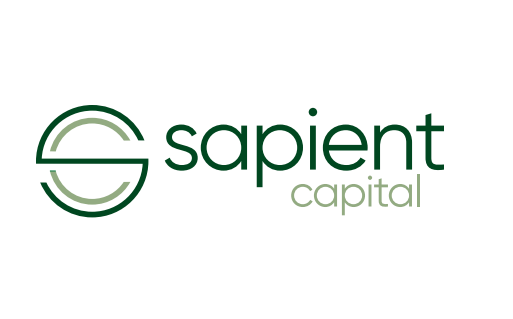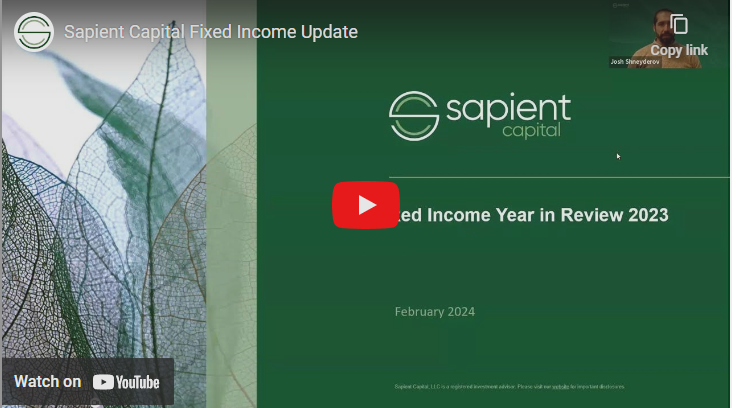Insights From Mike Hall, Partner at Sapient Capital
[15 minute read]
One of the most frequently asked questions when meeting with clients is, “Will the stock market go up or down over the next few months?” Since I don’t have a clear crystal ball, my answer is usually less than 100% confident and eventually I say I don’t know. However, “I don’t know” does not seem like a good answer. So, I posed the question about the future direction of the stock market to everyone’s favorite expert, ChatGPT. Here is part of what ChatGPT told me:
“I’m sorry, but I cannot predict short-term movements in the stock market. Stock market performance depends on a wide range of factors, including economic conditions, geopolitical events, and investor sentiment, which can change rapidly. If you’re considering investments, it’s best to consult with a financial adviser who can provide guidance tailored to your individual circumstances.”
The expert answered by referring the question back to me. “I don’t know” seems like the right answer though. However, most investors don’t like to hear those three words come out of their adviser’s mouth. Why is “I don’t know” an unacceptable answer?

“I don’t know” is difficult to accept because human beings don’t like uncertainty. Uncertainty is undesirable because all of us, from the day we are born, seek security and well-being. We have an instinctive drive to survive and our coping mechanism in an uncertain world is to move the unknown into the known, and thus, eliminate fear. If our ancestors did not strive for self-preservation, then we would not be here today! The desire to know what will happen in future is in our blood. It is part of who we are psychologically. If I meet with an investor who is interested about the future of the stock market and I answer “I don’t know if the stock market is going up or down over the next few months,” then I have not offered protection from an uncertain future. However, if I forecast, act based on the forecast, then I feel a sense of control, and I have less stress about tomorrow. Therefore, “trying to know” by forecasting reduces fear of an uncertain future.
Successful investors are knowledgeable about finance and economics, but I believe an understanding in psychology is just as important. There’s a saying that if you don’t know who you are, the stock market is an expensive place to find out. Analyzing a company’s income statement and balance sheet are essential, but so is understanding your mind. We live in a complex world and trying to understand our thoughts and emotions, which lead to action and decision-making, is complicated too. From personal experience, maybe the only thing more difficult to say other than “I don’t know” is “I was wrong.” Both statements are an attack on the ego, which is part of our personality that is concerned with self-image and status. The ego protects us from feeling insecure, that same innate drive to survive that demands certainty and control. Therefore, before I can tell someone “I don’t know,” I need to be able to express it to myself first and accept it as truth. Otherwise, I will resist admitting that I don’t know. If I am able to say I don’t know, then it can free me from false security and the stress of needing to have all of the answers. Instead of forecasting an unknowable future, it can lead to more productive activities, such as asking different questions and finding better answers.
But to accept “I don’t know” as a truth, I need to agree that everything in life is change. If life is change, then the world, including the stock market, is in flux and there is uncertainty about tomorrow. If there is uncertainty, then I cannot know the future. If I cannot know the future, then I don’t know. If I arrive here, instead of being afraid of the unknown, I accept it and gain composure in the acceptance.
Duality is a life concept that may help us understand how to accept change, manage our emotions, and diminish the need for control (let go). Duality describes the balanced interaction of opposite and competing forces. Every state of being has an opposite, and when you step back you don’t see them as separate, but one balanced whole. For example, one day has light when the sun rises and darkness when it sets. Both light and darkness, in one day. The blooming of flowers and trees with life in the spring are followed by the withering of leaves in the fall, or birth and death within one year. This is duality, or as some describe it, two sides of the same coin. The stock market illustrates duality with bull and bear markets (up and down markets). If an investor understands duality, then they will appreciate that a bull market will reveal a bear market and a bear market will reveal a bull market. They are not separate events, but both are part of one cycle – two sides of the same coin. An investor that expects to only reap the benefits of a strong stock market without feeling the pain of a market drawdown is like someone who runs outside screaming to stop the sun from setting at dusk. If I accept that the laws of nature also apply to the stock market, then investing gets less complicated and less stressful. Life (and the stock market) is change. The sun rises and the sun sets (stocks go up and stocks go down over time), duality in action, the interdependence of opposites. Finally, rather than spending time and energy predicting the future, I let go and focus on what I can control.
At this point, some of you may not agree with me. Maybe you, or your investment adviser, reduced equity exposure before a big market decline or you have been able to predict market bottoms. Therefore, you disagree with my premise that “I don’t know” is a reasonable response to the short-term direction of the stock market. If that is the case, I congratulate you. However, I don’t believe there are many investors who can consistently predict short-term movements in stock prices. Irrational exuberance was the term Federal Reserve Chairman Alan Greenspan used to describe the euphoria of an overvalued stock market in the mid-1990s, and many agreed with him. Greenspan called the stock market irrational in December 1996 and the next three years the S&P 500 Index doubled in value1. Remember the Great Recession of 2008 when we had the worst stock market since the 1930s2? There were a few smart people who predicted the housing bubble and equity market downturn, but not very many. It was so obvious to see the bubble after-the-fact in 2009 though. In early 2020, the COVID-19 pandemic pushed the stock market down more than 30% over four weeks3. Did anyone predict this to happen? Also, last year we had a 25% drawdown in the S&P 500 Index, hitting a bottom in October, and since last year’s bottom the S&P 500 Index has rallied nearly 25%4. If you were able to properly time the markets over the past few years, reducing equity exposure before market drawdowns and adding equity exposure after the declines, then you must have your crystal ball tightly guarded on your yacht! If that has not been your experience, and you agree that the future is uncertain and it is nearly impossible to predict, then what should you do to grow long-term wealth?
Howard Marks is co-founder of Oaktree Capital, a successful investment firm that manages approximately $180 billion. Howard has provided his wisdom by writing informative investment memos for more than thirty years. One of my favorite memos from Howard was written in November 2001 called, “You Can’t Predict. You Can Prepare.” The key concept can be summed up by Howard as follows:
“All of investing consists of dealing with the future, as I’ve written before, and the future is something we can’t know much about. But the limits on our foreknowledge needn’t doom us to failure as we acknowledge them and act accordingly. In my opinion, the key to dealing with the future lies in knowing where you are, even if you can’t know precisely where you’re going. Knowing where you are in a cycle and what that implies for the future is very different from predicting the timing, extent and shape of the next cyclical move.”
In the memo, Howard thoroughly describes market cycles and compares the stock market to a pendulum that swings between euphoria and depression, actually spending very little time near the midpoint. But as the pendulum moves to extremes, it is inevitable it will move back toward the midpoint sooner or later. In my opinion, Howard’s memo states:
a) “I don’t know” is a good answer about predicting the future,
b) stock market cycles are inevitable (life is change),
c) cycles are self-correcting over time (bull markets reveal bear markets and vice versa, the duality of life), and
d) manage the fear of an uncertain future by knowing where you are and having a plan.
If you can say, “I don’t know,” then I believe there are five key investment principles to follow to be a successful investor:
- Develop a strategy that meets your goals and objectives: This is Howard’s recommendation to be prepared and figure out where you want to go. Some investors cannot describe their investment strategy and the primary reason for this shortcoming is there isn’t one. There is no perfect plan and strategies can change over time, but developing a plan is the first step.
- Be patient and focus on long-term results. Morgan Housel from Collaborative Fund Management recently said, “There are three legal investment strategies: Be smarter than others, be luckier than others, be more patient than others. That’s the whole list.” I agree. I can’t control if I am smarter (I am not), I can’t depend on luck, but I can be patient and focus on a long-term strategy. Albert Einstein said the most powerful force in the universe is not gravitational force but the power of compounding interest. Stay invested for the long-term and let time and the power of compounding deliver results.
- Know what you own. Understanding how the investment portfolio is positioned today helps manage risk and provides awareness on the potential paths of the investment over time. Instead of forecasting the future and building a portfolio based on a prediction, understand what you own, and be attentive to how the portfolio could behave in various market environments.
- Control your emotions. The mind tends to compare what is happening to what it believes should be happening and this comparison creates an emotional reaction. Investors should understand what they can control – strategy, risk, taxes (in most cases), and their behavior; and understand what they cannot control, primarily short-term movements of the stock market.
- Reflect, review, and rebalance. If the stock market pendulum swings too far in either direction, there is a possibility that the investment portfolio has also moved too far in one direction (i.e., either more exposed to stocks than planned during a bull market or less exposed to stocks after a bear market). Therefore, rebalancing toward the desired risk tolerance forces you to “buy low and sell high” without complicating the decision-making process.
To be clear, “I don’t know” does not mean “I don’t care” about what can happen in the future. I read, study, analyze, and listen to smart people to gain a better understanding – a better understanding of where we are today. This job is hard enough without predicting the future too. Here is what I have decided: I don’t know. I can’t predict. I prepare.
Know thyself. What kind of investor are you?
The information provided is for educational and informational purposes only and does not constitute investment advice and it should not be relied on as such. It should not be considered a solicitation to buy or an offer to sell a security. It does not take into account any investor’s particular investment objectives, strategies, tax status or investment horizon. You should consult your attorney or tax advisor.
The views expressed in this commentary are subject to change based on market and other conditions. These documents may contain certain statements that may be deemed forward looking statements. Please note that any such statements are not guarantees of any future performance and actual results or developments may differ materially from those projected. Any projections, market outlooks, or estimates are based upon certain assumptions and should not be construed as indicative of actual events that will occur.
Sapient Capital is a registered investment advisor. Advisory services are only offered to clients or prospective clients where Sapient Capital and its representatives are properly licensed or exempt from licensure.
1, 2, 3, 4 Source: Bloomberg.


